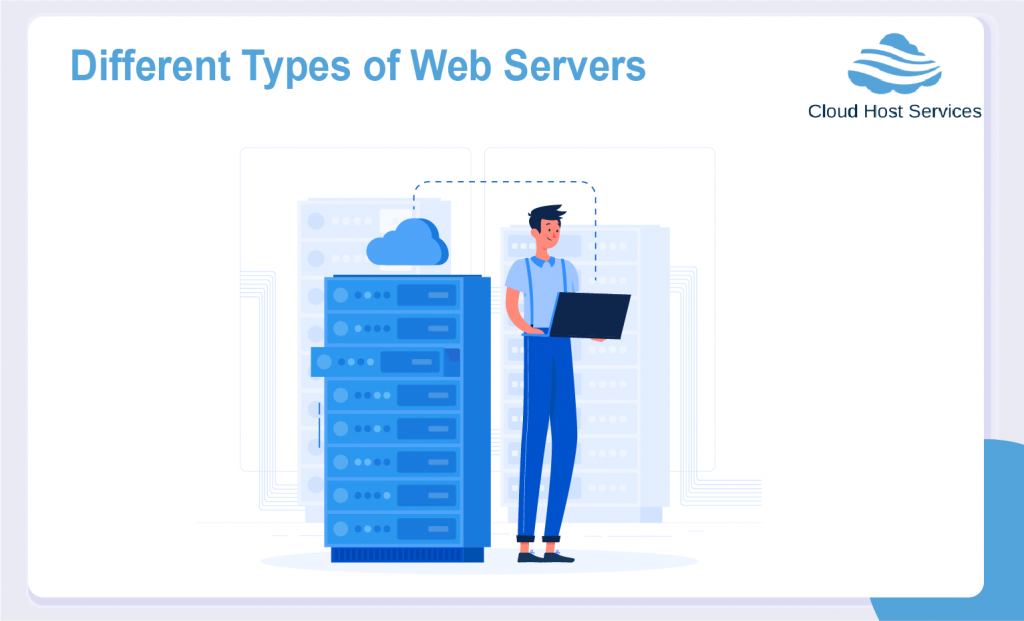
If you’re just building websites or surfing the Internet, you don’t need to know about the various types of servers. So, if you’re working on a big project that involves the Internet, you’ll need to know about the various types of web servers available.
What are Web Servers?
HTTP is a protocol used by web servers to allow access to the Internet. They look for and use HTML files, which are sent to web browsers and then translated so that the user can understand them. It can also access and store other types of files, but they are frequently associated with the HTML files it has, such as having images embedded in the HTML.
What are Web Servers Used For?
Web servers are primarily responsible for storing, processing, and delivering a website’s pages to users. In layman’s terms, web servers are responsible for making websites appear when you type in a URL.
Types of Web Servers:
There are 4 primary web servers:
- Apache (provided by Apache)
- IIS (provided by Microsoft)
- nginx (provided by NGINX, Inc. and pronounced like “Engine X”)
- GWS (provided by Google and short for Google Web Server)
Currently, Apache is the most popular web server, but IIS is gaining traction and, according to our predictions, will soon overtake Apache as the most popular web server. nginx is the most popular alternative because it is fast and light, while GWS is the least popular, with only a small percentage of users.
File Servers
They are frequently in charge of the accessibility and management of stored files, as well as their security. At the user’s request, you can send and receive files. These aren’t like sharing servers; they’re more like the Internet’s filing cabinets.
The way files on a file server are accessed is often used to classify the server. The various methods are as follows:
Internet File Servers:
- FTP (File Transfer Protocol)
- HTTP (HyperText Transfer Protocol)
LAN File Servers:
- SMB/CIFS Protocol
- NFS Protocol
As a result, file servers differ from web servers in that they do not provide dynamic web content. They only provide static files instead.
Application Servers
This is a server that is solely responsible for serving a single piece of software. As a result, it’s frequently used in tandem with other servers and software. If you sign up for online gaming, for example, you may be directed to servers dedicated solely to the gaming software.
Application Server Advantages:
- Data and Code Integrity
- Centralized Configuration
- Security
- Performance
- Lower Cost of Ownership
- Transaction Support
Types of Application Servers:
- Java Application Servers
- .Net Framework
- PHP Application Servers
- Open Source Application Servers
- Mobile Application Servers
Inter-server level devices
These are devices that bypass servers in order to send signals from one location to another in a logical order, similar to how a person can download a single file from multiple computers at the same time.
Message Servers
These are servers that enable real-time communication between users, for example. IRC servers, chat servers, and groupware are just a few examples. The communication methods are fairly adaptable.
Proxy Servers
It will act as a go-between for users’ server-to-filter requests and a client programme. As a result, it is possible to manage emails and shared connections.
Open proxies and reverse proxies are the two types of proxy servers.
Open Proxies
A forwarding proxy server that is open to all users is known as an open proxy. Open proxies that are anonymous allow users to hide their IP addresses while surfing the internet. As a result, the level of anonymity varies, and these aren’t always completely secretive because there are methods that cause the client to reveal themselves.
Reverse Proxies
Reverse proxies are a type of server that looks like a regular one. So, if a user requests information from the server, the request will be forwarded to one or more proxy servers, which will allow the user to receive the request as if it came from the original server while keeping the original server anonymous.
Proxy Server Uses
Proxy servers are used for a variety of purposes, both malicious and legitimate. Large corporations, for example, may use proxy servers to protect their data, while individuals may use proxies to avoid government, business, or school censorship.
Database Servers
As the database is stored on the server, they can manage it. They can use the SQL database management system to manage their data. As a result, the server can search through data and return any information that the client has requested.
Mail Servers
This is the type of server you’d use to manage your email, as the name implies. A server could be set up solely for the purpose of controlling and handling emails. As a result, it sends, receives, and saves your emails.
IMAP and POP3 servers are the two most common types of mail servers. Because it allows you to read your mail on multiple devices, IMAP is quickly becoming the most popular server.
As a result, most people won’t need (or want) to run their own mail server because Google, Microsoft, and a slew of other companies provide free email.
Need more information?
Our expert team is here to help with any questions you have regarding our products or services.
